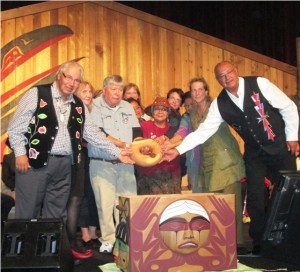Surviving, Thriving, and Refusing to “Get Over It”
By Kaitlyn Duthie-Kannikkatt
 One of the central events of the TRC gatherings is the Commissioner Sharing Panels. These forums give residential school survivors the opportunity to share their story in a public space with hundreds listening. In the last two days, I’ve borne witness to the stories of ten survivors and intergenerational survivors[1] who have bravely taken the stage to share the impacts the schools have had on their lives.
One of the central events of the TRC gatherings is the Commissioner Sharing Panels. These forums give residential school survivors the opportunity to share their story in a public space with hundreds listening. In the last two days, I’ve borne witness to the stories of ten survivors and intergenerational survivors[1] who have bravely taken the stage to share the impacts the schools have had on their lives.
It is impossible to listen to these stories and not be incredibly moved. Each one of these people has been through so much, and yet has garnered the strength to face those experiences with a righteous anger, and with profound grace.
One thing many stories seem to share in common is the experience of being told to “just get over it”. Doctors, teachers, psychiatrists, employers, partners, friends – the list of people in these survivors’ lives who just don’t seem to understand the nature of this trauma is astounding. There is no doubt that we need to collectively question the notion that trauma can be healed instantly, that intergenerational impacts can just disappear.
But there’s another dimension to how impossible that suggestion really is that surfaces as these survivors tell their stories. Residential schools are not an isolated incident in the attempted erasure of First Nations, Inuit and Métis people from Canada’s history. For over 500 years, our colonial system has attempted to extinguish the dignity and strength of Indigenous peoples. This is evident in the systems at work all around us – an education system that fails to teach a true history of this land, a policing system in which institutionalized violence and racism are rampant, a research system that continues to silence the voices of Indigenous communities and scholars, a federal government that promises reconciliation but has yet to hold an inquiry into the crisis of missing and murdered Indigenous women in Canada.
If we’re willing to pay attention, it’s easy to see the evidence of how ridiculous the notion of “getting over it” truly is. How can you “get over” an experience that manifests every time you apply for a job, walk into a doctor’s office, enter a classroom, or simply walk down the street?
Kim Quinney, an intergenerational survivor from Saddle Lake Cree Nation, began her story by telling us she was going to share the four stages of her spirit: her innocent spirit, her victim spirit, her survivor spirit, and finally, her warrior spirit. To her, that journey meant moving from a place of having trauma consume her, to building a life in which her children could feel safe and loved, to being a warrior for her people, staying strong through ceremony, through prayer, through keeping those traditions alive.
When we call someone a survivor, we’re recognizing many things: the strength it takes to wake up and face the day, the will it takes to break the cycle of intergenerational trauma, the courage to stay alive and to thrive in the face of immense and enduring hurt. Being a survivor means refusing to give in to the systems at play that continue to erase the experiences of Indigenous peoples. Being a survivor means being a warrior for your people, keeping stories and traditions and languages alive when mainstream society only wants them gone. Being a survivor means refusing to “just get over it”. I am so honoured to be present at this event, and to bear witness to the truths these survivors are brave enough to share.
[1] Intergenerational survivors are the children and grandchildren of residential school survivors that continue to feel the impacts of the trauma their family members experienced.








